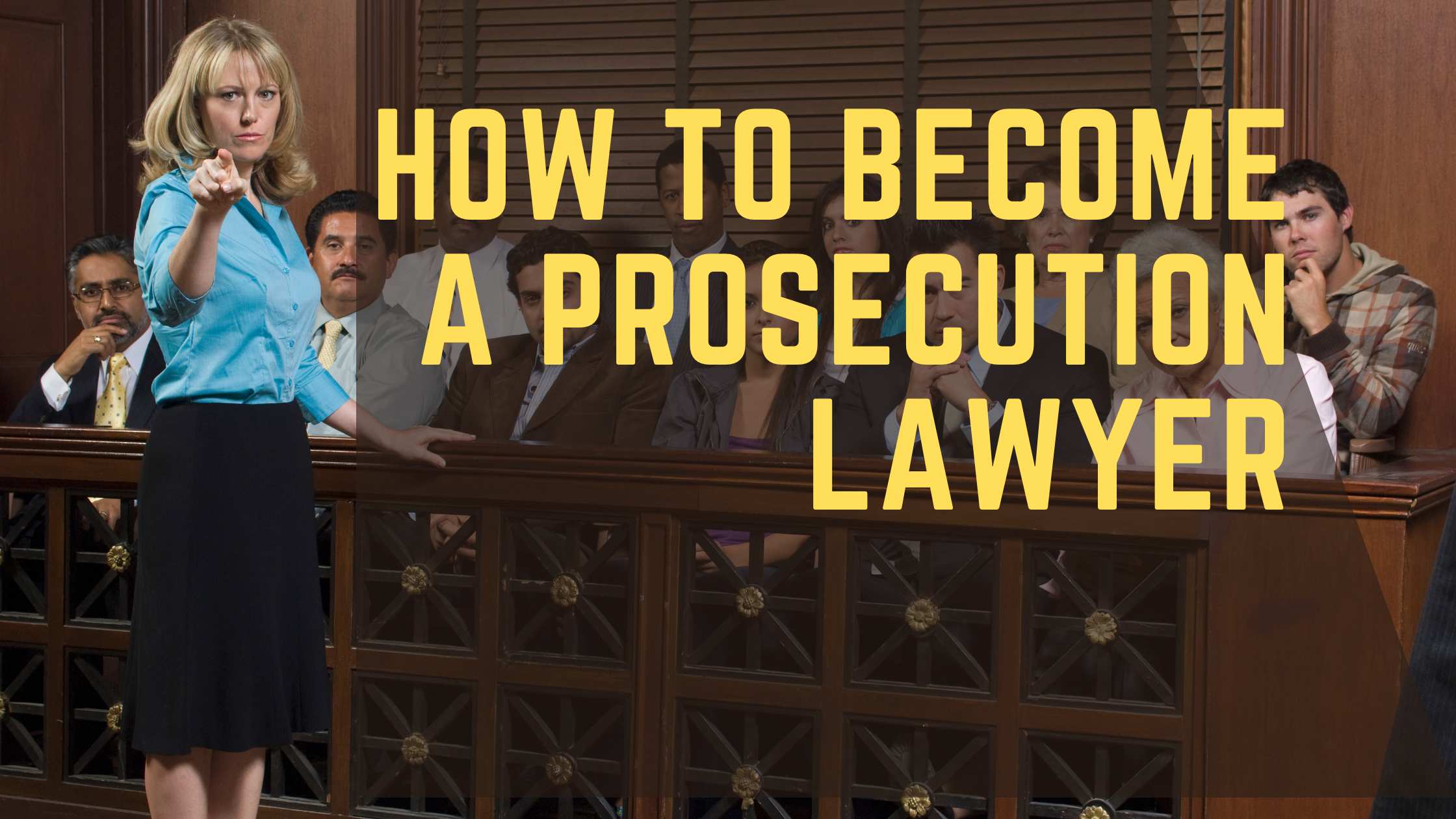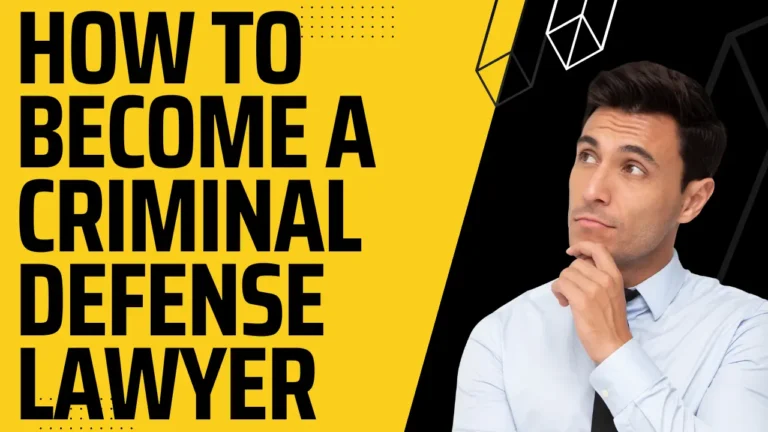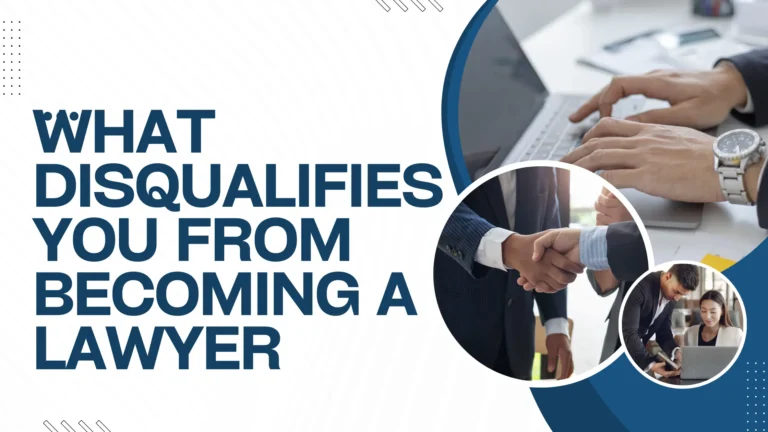How to Become a Prosecution Lawyer?

To become a prosecution lawyer, earn a law degree, and pass the bar exam. Then, gain experience by working in a prosecutor’s office.
Pursuing a career as a prosecution lawyer requires dedication to upholding the law and providing justice. This legal path starts with obtaining a Bachelor’s degree, followed by three years of law school to acquire a Juris Doctor (JD). After education, aspiring prosecutors must successfully navigate the bar examination in their respective jurisdiction.
How to Become a Prosecution Lawyer? Practical experience is essential; internships or clerkships at a district attorney’s or prosecutor’s office can provide valuable insight into the workings of the criminal justice system. Building a strong foundational knowledge of criminal law and courtroom procedures is crucial for those who envision themselves representing the government in criminal cases. Each step is instrumental in developing the necessary skills to advocate effectively for the state and its laws.
Path To Prosecution: Starting Your Journey
Dreaming of a career where you fight for justice? Becoming a prosecution lawyer could be your perfect path. But every journey begins with a single step. Your adventure into the world of law starts with a solid educational foundation and overcoming the challenge of law school admissions.
Educational Requirements: Building The Foundation
Your quest to become a prosecutor starts with education. First, you need a bachelor’s degree. Law schools don’t demand specific majors, so pick one you love. But, classes in English, public speaking, and government help. They sharpen skills essential for law.
Key takeaways:
- Obtain a bachelor’s degree
- Choose a major that interests you
- Take classes that build important skills
Lsat And Law School Admissions: The First Hurdles
After your degree, the Law School Admission Test (LSAT) awaits. Scoring high on the LSAT is crucial. It’s your ticket to a top law school. Prep courses and practice tests can help you ace it. With a strong LSAT score, you apply to law schools. Aim for ones with solid criminal law programs.
Remember:
- LSAT scores matter
- Prepare with courses and practice tests
- Choose law schools with good criminal law programs
Life At Law School: Grooming The Prosecuting Mind
The journey to becoming a prosecution lawyer starts in the halls of law school. Here, students not only learn the law but also begin to think like prosecutors. The grooming process is rigorous. It requires dedication to academics and hands-on experience through extracurricular activities. Let’s explore how law school prepares future prosecutors.
Coursework And Grades: Making The Grade
Becoming a prosecutor means mastering courses key to criminal law.
- Criminal Law: Understand the basics of what defines criminal behavior.
- Criminal Procedure: Learn how the justice system works.
- Evidence: Know what evidence is permissible in court.
- Trial Advocacy: Develop skills to argue a case effectively.
Success in these courses often leads to top grades. Top grades open doors to coveted internships and job offers. Law school demands excellence. Students aiming to become prosecutors must strive to be at the top of their class.
Extracurricular Activities: Moot Court And Internships
Beyond the classroom, law school offers vital practical experiences.
- Moot Court: Students participate in simulated court proceedings. Here, they practice arguing cases and think on their feet.
Meanwhile, internships provide a glimpse into the real world of prosecution. Students work alongside experienced lawyers. They tackle real cases. They witness the legal process firsthand. This experience is invaluable. It grooms students for their future roles as prosecutors.
Bar Admission: The Final Gateway
Becoming a prosecution lawyer is a dream for many aspiring legal professionals. The bar admission is that final step that turns a law graduate into a practicing lawyer. This gateway is not just a test of knowledge but a comprehensive check of a candidate’s readiness to uphold the law. It’s rigorous, demanding, and requires strategic preparation.
Preparing For The Bar Exam: Strategies And Tips
Conquering the bar exam requires a solid plan and effective study strategies. Prioritize core material—you must know the basics like the back of your hand. Create a study schedule that allows for consistent daily learning without burning out. Practice makes perfect, so frequent mock exams are a must. Here are some tips:
- Understand the format of the bar exam to tailor your study plan.
- Use study groups to explore diverse perspectives and tackle complex topics.
- Focus on weak areas while maintaining strengths through regular revision.
- Stay healthy: Regular sleep, good nutrition, and exercise boost brain function.
- Seek guidance from mentors who have successfully passed the bar exam.
The Character And Fitness Assessment: Maintaining Integrity
Passing the bar isn’t solely about legal knowledge. The character and fitness assessment evaluates your integrity. To be a prosecutor, maintaining a spotless moral compass is non-negotiable. The assessment may scrutinize past conduct, financial responsibility, and general character. Here is how to uphold integrity:
- Be honest about your history. Full disclosure is better than concealment.
- Stay consistent in your actions and words. Integrity shows over time.
- Prepare documents proving responsibility in personal and professional life.
- Seek endorsements from reputable sources who can vouch for your character.
Remember, the path to becoming a prosecution lawyer is challenging but rewarding. With dedication and the right approach to the bar exam and character assessment, you can reach your goal. Focus, integrity, and perseverance are your best tools on this journey.
Gaining Experience: The Building Blocks Of Practice
An integral step in becoming a prosecution lawyer is gaining the necessary experience. This experience serves as the foundation for your future practice. Real-world legal opportunities not only sharpen your skills but also provide invaluable insight into the workings of the criminal justice system. Let’s delve into how clerkships and specialized training can pave the way for a successful career in prosecution.
Clerkships And Legal Work Experience: The Practical Approach
Securing a clerkship is a golden opportunity. It offers a first-hand look at the legal process from the inside. Working closely with judges and experienced lawyers, you build a network that’s essential for a budding prosecution attorney. Real cases teach you more than textbooks ever could. Here’s how to capitalize on this experience:
- Research and apply to clerkships in criminal courts.
- Assist in case preparation and trial procedures.
- Observe courtroom dynamics to understand effective advocacy.
- Network with professionals to learn about career opportunities.
Clerkships are not the only way to gain practical knowledge. Law firms and public defender’s offices offer internships that are equally beneficial. These experiences enable you to apply your theoretical understanding in real-life scenarios.
Specializing In Criminal Law: The Focused Path
Specialization in criminal law sharpens your expertise in the field. Courses and certifications in criminal litigation provide a deep dive into the nuances of prosecution. Being focused on criminal law equips you with the tools needed to excel. Factors to consider include:
| Factor | Action |
|---|---|
| Select a Law School | Choose one with a strong criminal law department. |
| Participate in Moot Court | Hone litigation skills in a simulated environment. |
| Seek Mentorship | Find a mentor active in criminal law practice. |
In addition to academic focus, join criminal law associations. These organizations provide resources and connections to professionals in the field.
Landing The Job: Stepping Into The Role Of Prosecutor
Becoming a prosecution lawyer is an admirable goal. A challenging yet rewarding role awaits. Passionate about justice? Eager to represent the state or federal government in criminal court cases? The path is clear. Education and experience are key. Yet, the true test begins when pursuing employment. Stand out in the competitive legal job market and grasp your chance as a prosecutor.
Job Search And Networking: Connecting With Opportunities
Networking forms the backbone of many successful job hunts. For an aspiring prosecutor, knowing where and how to connect is crucial.
- Attend legal job fairs.
- Join professional organizations.
- Connect with law school alumni.
- Utilize social media platforms like LinkedIn.
Keep tabs on government websites for job postings. District Attorney and Attorney General offices regularly update career pages.
Interviews And Hiring Process: Presenting Your Case
The interview is your moment. Show your passion, knowledge, and skills. Articulate why you’re fit for a prosecutor’s role.
- Review common interview questions related to law and prosecution.
- Prepare to discuss your experience and cases you find inspiring.
- Exhibit strong ethical judgment and a firm understanding of the legal system.
Mock interviews can improve your performance. Seek feedback to refine your approach.
| Interview Phase | Action Items |
|---|---|
| Preparation | Research. Practice. Review. |
| Execution | Confidence. Clarity. Connection. |

Credit: www.juriseducation.com
Continuous Professional Development: Sharpening Your Skills
Becoming a successful prosecution lawyer demands dedication. Continuous professional development (CPD) is essential. It keeps your expertise fresh and sharp. Learn how CPD can take your skills to the next level.
Continuing Legal Education: Staying Up-to-date
The legal landscape changes fast. Continuing Legal Education (CLE) is vital. It ensures you remain knowledgeable about the latest legal developments. CLE can come in different formats:
- Seminars
- Workshops
- Webinars
- Online courses
Many legal bodies require CLE for lawyers. Such mandates ensure lawyers maintain their licenses. They offer varied topics, such as:
| Topic | Description |
|---|---|
| Case Law Updates | Discover the latest court decisions. |
| Ethical Practices | Learn about maintaining high ethical standards. |
| New Legislation | Understand how new laws affect your practice. |
Professional Organizations: Engaging With The Legal Community
Joining professional organizations is a smart move. It connects you with peers. It also gives access to exclusive resources. The benefits include:
- Networking opportunities
- Mentorship programs
- Access to legal journals and case studies
- Discounts on CLE programs
Membership in organizations can help you specialize. It aids in becoming an authority in specific areas of prosecution.
Some notable legal professional organizations are:
- American Bar Association (ABA)
- National Association of Criminal Defense Lawyers (NACDL)
- National District Attorneys Association (NDAA)
:max_bytes(150000):strip_icc()/what-is-a-criminal-lawyer-2164620_final-781c1129193d42059dd633798c7cec10.png)
Credit: www.liveabout.com
Conclusion
Embarking on the path to becoming a prosecution lawyer is a bold choice. It requires dedication, a solid educational foundation, and a passion for justice. By honing your skills and building your experience, you’ll be well-equipped to navigate the legal landscape.
Remember that perseverance and commitment are your beacons to success in this vital field.
Introducing Jonah Plum, a legal luminary whose journey through the corridors of justice has been intertwined with the eloquence of the written word. Born and raised in the vibrant city of Seattle, Washington, Jonah's early fascination with language and debate laid the foundation for a remarkable career in law.
Jonah's scholarly odyssey began at Harvard Law School, where they immersed themselves in the study of jurisprudence, honing their analytical prowess and legal acumen. Armed with a law degree, they entered the legal arena, navigating courtrooms and boardrooms with a fervor for justice. Yet, it was the realization of the transformative power of the written word that led Jonah to pivot from legal briefs to the world of blogging.
A digital advocate in the truest sense, Jonah recognized the need for demystifying legal concepts and making them accessible to a broader audience. This blog, a virtual repository of legal insights, transcends geographical boundaries, connecting with a global readership hungry for clarity amidst legal complexities.
Beyond the black letter of the law, Jonah delves into the human stories that underscore the legal landscape. Their writing goes beyond legal analysis, weaving narratives that humanize the law, shedding light on its impact on individuals and society.






